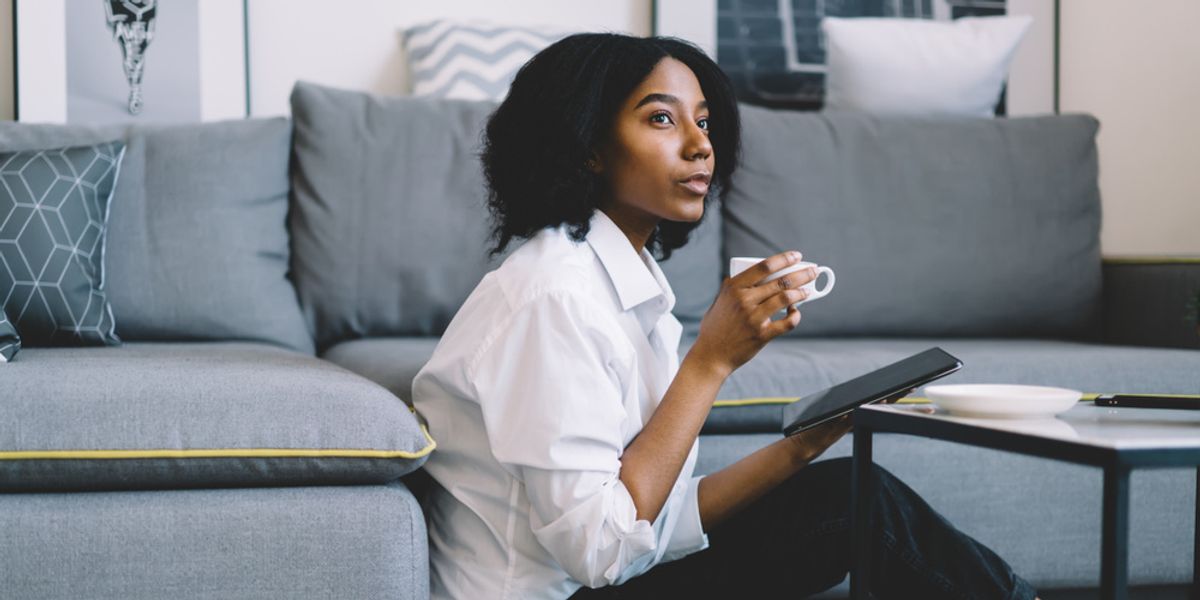
Practical Ways A Minimalist Lifestyle Frees Your Mind & Your Money
When you hear the word "minimalism", your mind probably formed an image of some privileged man with a dingy backpack wearing wrinkled khakis and flimsy flip flops. And if he has a place to live, you may imagine one plaid chair, one chipped plate, and one fork. We can even hear his voice tell those of us who value money, things, and experiences that we're too superficial. I'm also willing to bet that we're not about that lifestyle.
But what if I told you that minimalism isn't all tiny homes or hand-me-downs? What if I said we can still have nice things? Or that minimalism is just living in a way that gets rid of the meaningless stuff and curates a lifestyle filled with peace, purpose, and freedom? And let me not forget the best part of it all: You can ultimately build your bank account, too.
Christine Pratt understands the accumulation of things and the impact it has on our well-being as well as our coins. This Afrominimalist — as she's known on the 'gram — once had a closet full of accessories, shoes, and handbags within handbags within handbags as well as shelves full of knick-knacks. Yet, she reached a point where her life felt messy and oftentimes overwhelming. It wasn't until she cleared her apartment of anything that didn't serve a specific purpose that she was able to breathe. Christine makes a deeper connection between material, mindset and money in her first TED Talk titled "You Can Be a Minimalist, Yes You!" that she delivered this past November.
Fellow minimalists Roshanda Cummings (Roe) and Erin Johnson (E) are the individuals behind the Instagram community Brown Kids. Just a few years ago, an overworked Roe was ready to quit her underpaid job but worried about the rack of credit card debt that she created for her racks of clothing. But by adopting a minimalist lifestyle, she managed to pay off $11K in 11 months on a $19K annual salary.
11 whole thousand.
In less than a year.
On less than $20K per year.
How'd they do that?
"You have money," Roe says, "It's just in your stuff."
What kind of stuff, you ask? It's all those jeans we packed away in a tote because we're going to pull them back out when we lose those last 10 pounds. It's also the three types of edge control that we tucked way under the bathroom sink because they don't lay our baby hairs at all but we're keeping them, dammit, because we spent a lot of money on these jars! And some may say it's all the books I had neatly stacked and shelved but to that I'd reply, Mind yo' business. I'm reading all of them!
I suppose I can agree that it's all clutter and there are numerous studies linking physical clutter to internal clutter, but that's a whole other article. And the stuff that's out in the open for all to see? At some point we need to clean it, move it elsewhere, or dust it. Or even worse? Pack it up should we ever move! Embracing minimalism means that we either trash it, get paid for it, or pay it forward if we're not using it or getting some joy out of it. Minimalism also promises that we'll feel good for doing it.
Intrigued? Or still unsure? Read on for 4 points we can glean from Roe and Christine when it comes to adopting a minimalist lifestyle, especially when it comes to our bucks:
It empowers you to find “hidden” money.

E and Roe helped their Brown Kids community find $120K in forgotten money during a weeklong Instagram challenge. Roe stresses that regardless of our salaries, we always have extra money somewhere. She cashed in a stagnant 401(k) worth $4K from an old job but she also found $7K in unwanted stuff that she could sell and applied all of the proceeds directly to her credit card balance. And while we are aware of those sites where we can sell our infrequently or unworn clothing and shoes like Poshmark and Mercari, do we know about unexpected or forgotten refunds and utility deposits that we are due but we somehow overlooked? Did you know you can check with your state's unclaimed property department to see if any of those types of funds are waiting for you? Claim your coins, sis!
It encourages you to look at your finances differently.

Something about a strict budget is a turnoff. It seems to put an emphasis on the things we can't have because they were considered too minor to include in our monthly spending, like a caramel frappuccino. Although minimalism forces us to distinguish between wants and needs, it isn't designed to be as limiting as a traditional budget. Instead it makes us look inward to decide what's important to us and why.
Christine explains that our current spending habits are a reflection of how we were raised. As an attorney and author, she became the first person in her family to be able to acquire any and everything, which led to her overconsumption of purses and heels. Once we get to the root of our destructive spending habits, we'll automatically make different financial choices going forward, which means we'll think twice before making a frivolous purchase.
It helps to decrease unnecessary food waste.

Shutterstock
In 2010, food waste was estimated to be about a third of the food supply, or a whopping $162B! We contribute to this figure when we buy and cook more than we can eat and then it spoils, causing us to throw it all out. But that doesn't mean we need to resort to canned or dried foods!
E and Roe are the brainchildren behind the Jar Method, which is their way of storing and extending the life of produce from three days up to three whole weeks. E and Roe saved $500 the very first month they kept their veggies in glass jars instead of in plastic bags and containers. And not only did they lower their monthly grocery bill, but they also made their refrigerator shelves look pretty, too.
It shows us that sales don’t automatically add up to savings.

One of the biggest myths about minimalism is that you can't shop, especially for items at full price. Lies. E and Roe snatched up a pristine secondhand outdoor furniture set a few months ago but they also looked to decorate their interior with West Elm or CB2.
"A minimal mind is not about cheapness or class," says Roe during an earlier interview with Impossible Podcast. She explains that it's about clarity. Will this item reflect you or the person you want to be? Will this item bring you joy?
Roe isn't against splurging on an item of clothing, either, but if it's expensive, she's mindful of its quality, sustainability, and usability. What is it made of? Will it last? How was it sourced? Will she wear it more than once?
"Sometimes you'll spend a lot and sometimes you spend less and sometimes you won't spend at all," Roe adds.
Christine often refers to Project 333, a challenge where you mix and match 33 favorite pieces (including accessories and shoes) to create new outfits for 3 months. This way, you essentially end up with a complete seasonal wardrobe that takes up less closet space.
Buying new quality pieces to fulfill the 33-item capsule wardrobe isn't forbidden and buying as much as you can for as little as possible isn't a requirement or even a recommendation. In fact, snatching up everything you see on clearance is frowned upon and defeats the purpose of minimalism.
Bargain-shopping for Christine was once an escape until it wasn't. She was stunned by all of her purchases with price tags still hanging on them. Sure, she walked out of the store with shopping bags full of merchandise at a deep discount but she didn't exactly gain anything when she wasn't even wearing, using, or really liking anything she bought. "Remember, it's not a deal if you don't need it," Christine says.
Minimalism isn't as extreme as we may think. The sole intent shouldn't be to make unreasonable or unrealistic sacrifices or forego everything of luxury or leisure to stretch our hard-earned dollars. It's not even about junking our most sentimental treasures, either.
Instead, minimalism is about sparking more joy with less stuff and living much better in the process. Sure, it may still be hard to give up some things because, let's face it, who's really a pro at purging their own belongings? But imagine that bit of excitement we'll get when we move those dollars from credit card balances to savings account balances with items we don't use, don't care about, and won't miss.
Want more stories like this? Sign up for our newsletter here and check out the related reads below:
6 Ways You Can Start Stacking Your Savings
The Minimalist Guide To Fall Style
10 Budgeting Apps That Will Get Your Coins All Together
Featured image by Shutterstock
Did you know that xoNecole has a podcast? Subscribe on Apple Podcasts or Spotify to join us for weekly convos over cocktails (without the early morning hangover.)
- 4 Ways I’ll Continue To Save Money Post-Quarantine - xoNecole: Women's Interest, Love, Wellness, Beauty ›
- Starting A Minimalist Lifestyle, Advice - xoNecole: Women's Interest, Love, Wellness, Beauty ›
- How to Save Money Like a Minimalist | Minimalist Money Saving Tips ›
- 7 Minimalist Lifestyle Tips That Save Time and Money - The Portable ... ›
- Save Money with Minimalism - YouTube ›
- 3 Super Simple Ways that Minimalism Saves You Money ›
- 5 Minimalist Secrets to Saving Money | Simplicity Relished ›
- 7 ways minimalist living can help you save money ›
- How minimalist millennials are going to extremes to save money ›
- How Minimalism Saves Money and Improved My Financial Life ›
- 5 Practical Ways Minimalism Saves Money ›
- 8 Ways a Minimal Lifestyle Can Help Your Finances ›
I write about lifestyle and women's health and wellness. When I'm not in front of a computer screen crafting stories, I'm in a kitchen crafting cocktails. Follow me on the 'gram @teronda.
ItGirl 100 Honors Black Women Who Create Culture & Put On For Their Cities
As they say, create the change you want to see in this world, besties. That’s why xoNecole linked up with Hyundai for the inaugural ItGirl 100 List, a celebration of 100 Genzennial women who aren’t afraid to pull up their own seats to the table. Across regions and industries, these women embody the essence of discovering self-value through purpose, honey! They're fierce, they’re ultra-creative, and we know they make their cities proud.
VIEW THE FULL ITGIRL 100 LIST HERE.
Don’t forget to also check out the ItGirl Directory, featuring 50 Black-woman-owned marketing and branding agencies, photographers and videographers, publicists, and more.
THE ITGIRL MEMO

I. An ItGirl puts on for her city and masters her self-worth through purpose.
II. An ItGirl celebrates all the things that make her unique.
III. An ItGirl empowers others to become the best versions of themselves.
IV. An ItGirl leads by example, inspiring others through her actions and integrity.
V. An ItGirl paves the way for authenticity and diversity in all aspects of life.
VI. An ItGirl uses the power of her voice to advocate for positive change in the world.
Let’s make things inbox official! Sign up for the xoNecole newsletter for daily love, wellness, career, and exclusive content delivered straight to your inbox.
Listen, You're Totally Missing Out If You've Never Tried 'Yoga Sex' Before
Deflecting. If there’s one thing that irks me to absolutely no end, it’s when someone tries to avoid personal accountability — or even just a direct question — by deflecting. Take some people, who are barely in their 50s, who try to tell me that they are basically in a sexless marriage due to their age.
Chile, please. Reportedly, over 40 percent of people between the ages of 60-85 are sexually active (I personally think it’s much higher than that), and more than half between the ages of 57-75 (and one-third between the ages of 75-85) participate in oral sex. Matter of fact, a great example of all of this is TikTok sensation (and her husband) Rita 'Badgirlriri504' Smith who’s been married 43 years and talks about intimacy with her man every chance she gets. And you know what? I adore seeing it (check out “Marriage Tips with Social Media Creator Rita 'Badgirlriri504' Smith”)!
And just what does all of this have to do with today’s topic? Well, while talking to two of my clients not too long ago — people who are also well into their 60s — about the fact that they try to get it in at least twice a week (see what I mean? And that doesn’t include oral), when I asked them what their secret was, the wife said, without hesitation, “Simple. We do yoga sex.”
It’s pretty redundant for me to say that I write about sex a lot, which means that I research it too; however, I’ve got to admit that although I know that certain positions can make engaging in copulation easier, it never crossed my mind that there was something known as yoga sex. Yet, as the couple broke it down to me, I found myself becoming more and more intrigued. And that caused me to do some looking around so that I could share the wealth.
Because if your sex life is already bomb as hell, things are slowing down a bit, and you need a bit of “oomph” to fuel the fire again or, deep down, you know that you’re deflecting when it comes to your sex life and you want to change that — yoga sex could be the answer to all of your sexual needs. Read on to see what I mean.
Let’s Review Some Overall Benefits of Yoga, in General, First
 Giphy
GiphyThe gym? It’s never been something that has tickled my fancy, not even a little bit. Oh, but as my metabolism is slowing down and I can tell that I’m deep in the throes of perimenopause (CHILE), I’ve accepted that I need to be more intentional about exercise than ever. And since you can find just about anything that you’re looking for on the internet, I’ve found myself taking a real liking to yoga.
As far as health-related and direct physical benefits go, there are many:
- Yoga helps to reduce stress
- Yoga helps to decrease bodily inflammation
- Yoga helps to boost your immunity
- Yoga strengthens your body
- Yoga increases flexibility
- Yoga gives you more balance and improves your posture
- Yoga elevates your mental health
And that really is just the tip of the iceberg! Since you can get all of this from apps that offer classes for free (you can get a list of some of them here, or you can put “yoga classes” in the search field of YouTube as well), which means that you can do yoga from the comfort and convenience of your own home, why wouldn’t you want to at least give it a shot? Especially if, as you’re about to see, you can incorporate sex into yoga too?
So, What’s This “Yoga Sex” Thing All About?
 Giphy
GiphyIf you actually took the list of benefits that I just provided seriously, it should make all the sense in the world why yoga would help to improve people’s sex lives. If you’re less stressed, it’s easier to orgasm. If you have less bodily inflammation, sex is more comfortable. If you have a solid immune system, you’re in a better mood for sex. If your body is stronger, you will have more stamina during sex. The more flexible you are, the more sex positions you can try. The better your posture is, the easier it is to breathe deeply (which also increases your chances of climaxing). And if your mental health is in a great state, the more satisfying sex will be for you overall.
Okay, but there’s more. Some studies actually reveal that women who participate in yoga on a regular basis are more easily aroused, lubricate more, and experience less bodily discomfort — and get this, especially if they are over the age of 45. One study even went so far as to reveal that 75 percent of women who did yoga consistently said that they were more satisfied with their sex life than before yoga became a part of their lifestyle. Impressive…impressive indeed.
So, what makes “yoga sex” a thing? Well, it’s basically when people bring standard yoga positions into their sex life. Meaning, it’s not about learning positions that will make you stronger and more flexible in the bedroom beforehand; no, yoga sex is about literally doing yoga while having sex.
For instance, say that your goal for sex is to experience deeper penetration from your partner. A position that you might want to try is the cobra pose (here) where you first get on your stomach and then lift the upper half of your body with your hands while keeping your arms straight. If your partner straddles you, it frees their body up to penetrate you while also stimulating your neck and shoulders with his hands and mouth.
Or, if you like the missionary position yet you want to give it a bit of an upgrade, the bridge pose (here) can make that happen because it’s all about being on your back and then lifting the lower half of your body while your feet are planted on the ground (or your bed if your core is strong and your partner is helping to hold you up). Word on the street is this is a top-tier cunnilingus position. Report back. #wink
Maybe you’ve always wanted to experience a cervical orgasm. Getting on your back and throwing your legs over your head, and then being penetrated is one of the best ways to achieve this goal; that position is called the plow pose (here).
Now that I’ve broken yoga sex down a bit, do you see the potential that it holds? Do you also see how taking up some yoga, outside of sex, could better prep you for yoga sex?
If all of this has piqued your interest, first let me say that there are other traditional yoga positions that would be great for sex too like the forward bend and reclining butterfly (here) or the happy baby and cat-cow (here) — and honestly, that’s only the beginning because, the more confident you become, the more positions you’ll probably want to experiment with. The really awesome thing is, when it comes to yoga sex, positions aren’t the only thing that you can explore; there are different types of yoga sex too. Let’s touch on that briefly as well.
Did You Know That There Are Different Kinds of Yoga Sex?
 Giphy
GiphySo, what do I mean by different types of yoga sex? Great question.
Tantric yoga: This type of yoga focuses on the more spiritual side of intimacy. It does this by incorporating practices that help with meditation (check out “What Exactly Is 'Orgasmic Meditation'?”), flexibility and deep breathing.
Orgasmic yoga:If you want to control your pelvis more, strengthen your core, and become an expert when it comes to breathwork, then orgasmic yoga will be more your speed (for the record, from what I’ve read, belly dancing actually qualifies as a form of orgasmic yoga. Just an FYI).
Kink yoga: If BDSM is your thing, then this is the kind of yoga that you’ve been looking for. The main aim here is to use yoga to get you to become more flexible and more mindful during sex.
When it comes to all three of these, if you live in a major city, there’s a pretty good chance that you can find a class that specializes in them. Otherwise, YouTube has some introductions to all of these too.
3 Tips for Yoga Sex Beginners
 Giphy
GiphyAnd what if yoga sex is something you’re down with yet you’re not sure how to start? Well, here are a few tips that can make even trying yoga sex tonight a more pleasurable experience.
1. Decide on positions beforehand. Good foreplay isn’t just about what you do 15 minutes before intercourse; it’s about getting each other’s minds “right” long before that. So, put your partner in the mood by emailing or texting pictures of some positions you’d like to try. It will get his mind in the mood and his imagination going; it’ll also give you some time to practice (just sayin’).
2. Create a “yoga-like” atmosphere. Listen, one of the key principles of yoga is cultivating an environment for mindfulness and peace. So, if you’re trying to do this with the television on, the kids yelling downstairs, or with your mind on a billion different things, it’s not going to work. You need quiet. You also need a lot of room. You need scents (like lavender, jasmine, vanilla, neroli, or sandalwood) that make you feel calm and relaxed. And you need soft lighting; it brings about a sense of tranquility. What about sounds? Instrumental or nature ones are probably gonna work best because they won’t break your concentration.
3. Always meditate (together) first. You’re kinda gonna miss the whole point of yoga sex if you just walk into your bedroom and immediately get into the downward dog. Remember that mindfulness, peacefulness, and pacing oneself are all benefits of yoga — and meditation is what achieves all of this. Plus, meditation is proven to control anxiety, bring about self-awareness, and even give you a greater attention space. So, before any foreplay even begins, sit on the floor across from your partner, look into each other’s eyes, and breathe, deeply, in and out together, for at least 3-5 minutes. It will bring forth an energy that will make yoga sex — and orgasming — truly incomparable…that’s what my clients tell me anyway. #wink
____
It really is so time out for bringing ageism into sex. If the body is able and the spirit is willing, you can be out here rivaling the 20-somethings. Yoga sex is just one option that cosigns on this — and has the data to prove it, chile. Enjoy!
Let’s make things inbox official! Sign up for the xoNecole newsletter for daily love, wellness, career, and exclusive content delivered straight to your inbox.
Featured image by Delmaine Donson/Getty Images









